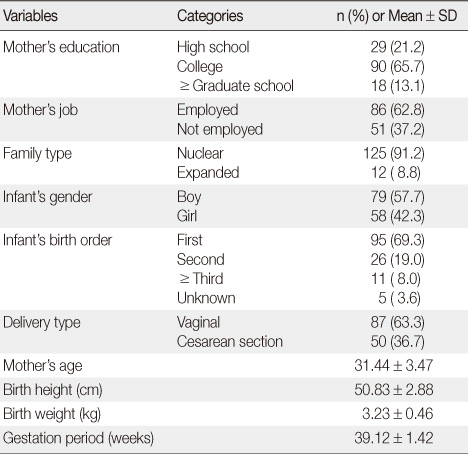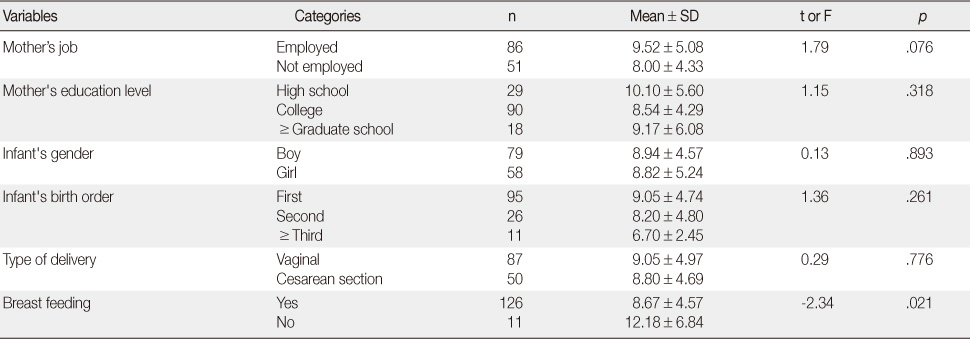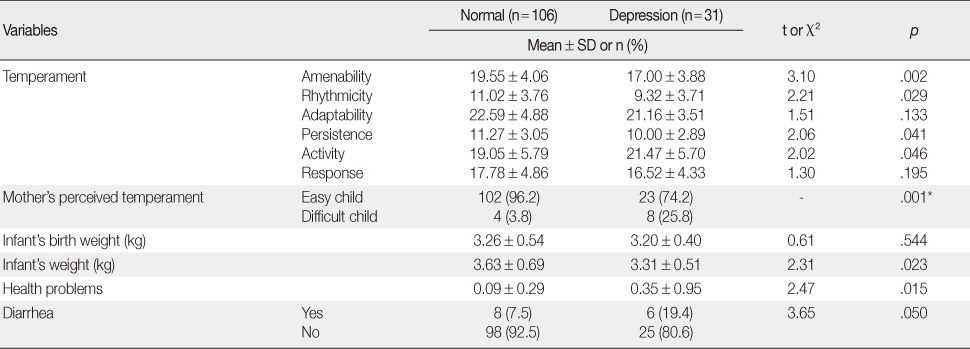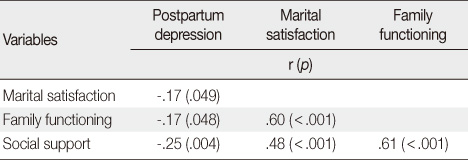Articles
- Page Path
- HOME > J Korean Acad Nurs > Volume 41(4); 2011 > Article
-
Original Article
- Infants' Temperament and Health Problems according to Maternal Postpartum Depression
- Kyung-Sook Bang
-
Journal of Korean Academy of Nursing 2011;41(4):444-450.
DOI: https://doi.org/10.4040/jkan.2011.41.4.444
Published online: August 31, 2011
Associate Professor, College of Nursing · The Research Institute of Nursing Science, Seoul National University, Seoul, Korea.
- Address reprint requests to: Bang, Kyung-Sook. College of Nursing, Seoul National University, 28 Yeongeon-dong, Jongno-gu, Seoul 110-799, Korea. Tel: +82-2-740-8819, Fax: +82-2-765-4103, ksbang@snu.ac.kr
© 2011 Korean Society of Nursing Science
Abstract
-
Purpose
- Mothers' postpartum depression is a worldwide health concern that produces compromising effects on their infants. This study was conducted to compare the infants' temperament and health problems according to the presence of maternal postpartum depression.
-
Methods
- Data were collected from May to October in 2009. The sample was 137 mothers at one month postpartum. The Edinburgh Postpartum Depression Scale (EPDS) was used to assess depressive symptoms.
-
Results
- At one month postpartum, 22.6% of mothers were classified as having postpartum depression. Infants of depressed mothers were more frequently classified as difficult temperament infants. They showed lower scores on the amenability, rhythmicity and persistency and higher scores on activity in temperament. Also, infants of depressed mothers reported more infant health problems at one months. Maternal depression showed significant negative correlations with family functioning, social support and marital satisfaction.
-
Conclusion
- Study findings show that postpartum maternal depression is associated with infants' temperament and health, and thus screening and early interventions for postpartum depression would promote the health of both the mother and infant.
This work was supported by Basic Science Research Program through the National Research Foundation of Korea (NRF) funded by the Ministry of Education, Science and Technology (MEST) (KRF-2008-E00671).
- 1. Adewuya AO, Ola BO, Aloba OO, Mapayi BM, Okeniyi JA. Impact of postnatal depression on infants' growth in Nigeria. Journal of Affective Disorders. 2008;108:191–193. doi:10.1016/j.jad.2007.09.013.ArticlePubMed
- 2. Avan B, Richter LM, Ramchandani PG, Norris SA, Stein A. Maternal postnatal depression and children's growth and behaviour during the early years of life: Exploring the interaction between physical and mental health. Archives of Disease in Childhood. 2010;95:690–695. doi:10.1136/adc.2009.164848.ArticlePubMed
- 3. Bang KS. Effects of maternal role education program on the mother-infant interaction and infant development. 2000;Seoul, Seoul National University. Unpublished doctoral dissertation.
- 4. Barnard KE. The nursing child satellite training series, nursing child assessment satellite training, learning resource manual. 1978;Seattle, NCAST, University of Washington.
- 5. Beck CT. A meta-analysis of the relationship between postpartum depression and infant temperament. Nursing Research. 1996;45:225–230.ArticlePubMed
- 6. Beck CT. Postpartum depression: It isn't just the blues. The American Journal of Nursing. 2006;106:40–50.
- 7. Carey WB, McDevitt SC. Coping with children's temperament: A guide for professionals. 1995;NY, Basic Books.
- 8. Chung HS. Developmental pattern of marital satisfaction. Journal of Korean Home Management Association. 1996;14:51–60.
- 9. Cox JL, Holden JM, Sagovsky R. Detection of postnatal depression: Development of the 10-item Edinburgh Postnatal Depression Scale. British Journal of Psychiatry. 1987;150:782–786.
- 10. Dennis CL, McQueen K. The relationship between infant-feeding outcomes and postpartum depression: A qualitative systematic review. Pediatrics. 2009;123:e736–e751. doi: 10.1542/peds.2008-1629.ArticlePubMedPDF
- 11. Faul F, Erdfelder E, Lang AG, Buchner A. G*Power 3: A flexible statistical power analysis program for the social, behavioral, and biomedical sciences. Behavior Research Methods. 2007;39:175–191.ArticlePubMedPDF
- 12. Goldbort J. Transcultural analysis of postpartum depression. MCN. The American Journal of Maternal Child Nursing. 2006;31:121–126.ArticlePubMed
- 13. Hanington L, Ramchandani P, Stein A. Parental depression and child temperament: Assessing child to parent effects in a longitudinal population study. Infant Behavior and Development. 2010;33:88–95. doi:10.1016/j.infbeh.2009.11.004.ArticlePubMed
- 14. Horwitz SM, Briggs-Gowan MJ, Storfer-Isser A, Carter AS. Prevalence, correlates, and persistence of maternal depression. Journal of Women's Health. 2007;16:678–691. doi:10.1089/jwh.2006.0185.Article
- 15. Kim J, Buist A. Postnatal depression: A Korean perspective. Australas Psychiatry. 2005;13:68–71.ArticlePubMedPDF
- 16. Kim MW, Yang HS, Kim JR. A study on agreements among screening tests and related factors with postpartum depression. Korean Journal of Obstetrics and Gynecology. 2009;52:1133–1143.
- 17. Klainin P, Arthur DG. Postpartum depression in Asian cultures: A literature review. International Journal of Nursing Studies. 2009;46:1355–1373. doi:10.1016/j.ijnurstu.2009.02.012.ArticlePubMed
- 18. Kwon MK, Kim HW, Kim NS, Jang JA. Postpartum depression and maternal role confidence, parenting stress, and infant temperament in mothers of young infants. Journal of Korean Academy of Child Health Nursing. 2006;12:314–321.
- 19. Lee IS, Park YS, Song MS, Lee EO, Kim HS, Park YH, et al. A study on the development of the Korean family functioning scale. Journal of Korean Academy of Nursing. 2002;32:395–405.ArticlePDF
- 20. McGrath JM, Records K, Rice M. Maternal depression and infant temperament characteristics. Infant Behavior and Development. 2008;31:71–80. doi:10.1016/j.infbeh.2007.07.001.ArticlePubMed
- 21. Murray L, Carothers AD. The validation of the Edinburgh post-natal depression scale on a community sample. British Journal of Psychiatry. 1990;157:288–290.Article
- 22. Orhon FS, Ulukol B, Soykan A. Postpartum mood disorders and maternal perceptions of infant patterns in well-child follow-up visits. Acta Paediatrica. 2007;96:1777–1783. doi:10.1111/j.1651-2227.2007.00557.x.ArticlePubMed
- 23. Park JW. A study of social support scale development. 1985;Seoul, Yonsei university. Unpublished doctoral dissertation.
- 24. Park YJ, Shin HJ, Ryu HS, Cheon SH, Moon SH. The predictors of postpartum depression. Journal of Korean Academy of Nursing. 2004;34:722–728.ArticlePubMedPDF
- 25. Pawlby S, Sharp D, Hay D, O'Keane V. Postnatal depression and child outcome at 11 years: The importance of accurate diagnosis. Journal of Affective Disorders. 2008;107:241–245. doi:10.1016/j.jad.2007.08.002.ArticlePubMed
- 26. Pridham KF, Chang AS, Chiu Y. Mothers' parenting self-appraisals: The contribution of perceived infant temperament. Research in Nursing and Health. 1994;17:381–392.ArticlePubMed
- 27. Rahman A, Bunn J, Lovel H, Creed F. Maternal depression increases infant risk of diarrhoeal illness: A cohort study. Archives of Disease in Childhood. 2007;92:24–28. doi:10.1136/adc.2005.086579.ArticlePubMed
- 28. Song JE. Influencing factors of postpartum depression between 4 to 6 weeks after childbirth in the postpartum women. Korean Journal of Women Health Nursing. 2009;15:216–223.Article
- 29. Yeo JH. Postpartum depression and its predictors at six months postpartum. Korean Journal of Women Health Nursing. 2006;12:355–362.ArticlePDF
REFERENCES
Figure & Data
REFERENCES
Citations

- The Coexistence of Postpartum Depression with Infantile Colic and Sleep Problems
Bülent GÜNEŞ, S. Songül YALÇIN
Turkish Journal of Pediatric Disease.2023; : 1. CrossRef - The longitudinal effects of children’s temperament on maternal depression: A hierarchical linear modeling approach
Chul-Gyu Kim, Mi-Young Choi
The Journal of Korean Academic Society of Nursing Education.2022; 28(1): 91. CrossRef - Maternal attachment and mental health status in mothers who have babies with infantile colic
Hülya Türkmen, Bihter Akın, Yasemin Erkal Aksoy, Ayfer Erdoğan
Midwifery.2022; 110: 103339. CrossRef - Prevalence and predictors of postpartum depression in Upper Egypt: A multicenter primary health care study
Gellan K. Ahmed, Khaled Elbeh, Randa M Shams, Maram Ali Abdel Malek, Ahmed K Ibrahim
Journal of Affective Disorders.2021; 290: 211. CrossRef - Validation of the Korean version of the Perinatal Infant Care Social Support scale
Mihyeon Park, Hyeji Yoo, Sukhee Ahn
Korean Journal of Women Health Nursing.2021; 27(4): 307. CrossRef - Relation between Mother’s Taekyo, Prenatal and Postpartum Depression, and Infant’s Temperament and Colic: A Longitudinal Prospective Approach
Kyung-Sook Bang, Insook Lee, Sungjae Kim, Yunjeong Yi, Iksoo Huh, Sang-Youn Jang, Dasom Kim, Sujin Lee
International Journal of Environmental Research and Public Health.2020; 17(20): 7691. CrossRef - Prenatal smoking and postpartum depression: a meta-analysis
Hong-Lin Chen, Ji-Yu Cai, Man-Li Zha, Wang-Qin Shen
Journal of Psychosomatic Obstetrics & Gynecology.2019; 40(2): 97. CrossRef - Economic and Health Predictors of National Postpartum Depression Prevalence: A Systematic Review, Meta-analysis, and Meta-Regression of 291 Studies from 56 Countries
Jennifer Hahn-Holbrook, Taylor Cornwell-Hinrichs, Itzel Anaya
Frontiers in Psychiatry.2018;[Epub] CrossRef - Perinatal depression effects: A narrative review
Tiffany Field
OA Journal of Pregnancy and Child Care.2018;[Epub] CrossRef - The Effects of Puerperium Maternal Anxiety, Marital Relationships, and Depression on Late Postpartum Depression
김수연, 소향숙
JOURNAL OF THE KOREAN SOCIETY OF MATERNAL AND CHILD HEALTH.2017; 21(2): 139. CrossRef - Predictors of Quality of Life in Mothers of Premature Infant
Hyosin Choi, Yeonghee Shin
Korean Journal of Women Health Nursing.2017; 23(3): 191. CrossRef - Factors Influencing Maternal Depression: Secondary Data Analysis
Chul-Gyu Kim, Mi-Young Choi
Korean Journal of Adult Nursing.2016; 28(3): 288. CrossRef - Parenting process model during the transition to parenthood : Mediation effect of psychological adjustment
Young Eun Chang
Family and Culture.2016; 28(1): 59. CrossRef - Relations of Postpartum Depression with Socio-Demographic and Clinical Characteristics of Preterm Infants and Mothers.
Kyung Sook Bang, Hyun Ju Kang, Mi Kyung Kwon
Child Health Nursing Research.2015; 21(1): 1. CrossRef - Magnitude and risk factors for postpartum symptoms: A literature review
M.N. Norhayati, N.H. Nik Hazlina, A.R. Asrenee, W.M.A. Wan Emilin
Journal of Affective Disorders.2015; 175: 34. CrossRef - Effects of Foot-Reflexology Massage on Fatigue, Stress and Postpartum Depression in Postpartum Women
Mi Son Choi, Eun Ja Lee
Journal of Korean Academy of Nursing.2015; 45(4): 587. CrossRef - Influencing Factors of Depression in Drugs Exposure Pregnant Women
Yoon Soon Jung, 한정열, Hee Kyung Kim
JOURNAL OF THE KOREAN SOCIETY OF MATERNAL AND CHILD HEALTH.2014; 18(2): 273. CrossRef - A prospective study of the parent–baby bond in men and women 15 months after birth
Y. Parfitt, S. Ayers, A. Pike, D.C. Jessop, E. Ford
Journal of Reproductive and Infant Psychology.2014; 32(5): 441. CrossRef - Infant Developmental Outcomes: A Family Systems Perspective
Ylva Parfitt, Alison Pike, Susan Ayers
Infant and Child Development.2014; 23(4): 353. CrossRef - Status of Antepartum Depression and Its Influencing Factors in Pregnant Women
Eun-Joo Lee, Jeong-Sook Park
Journal of the Korea Academia-Industrial cooperation Society.2013; 14(8): 3897. CrossRef
General Characteristics (N=137)
Postpartum Depression Scores according to Participant's Characteristics (N=137)
Comparison of Infant's Temperament and Health Problems between Two Groups
*Fisher's exact test.
Relationships among Postpartum Depression, Marital Satisfaction, Family Functioning and Social Support (N=137)
*Fisher's exact test.
 KSNS
KSNS
 E-SUBMISSION
E-SUBMISSION




 Cite
Cite

